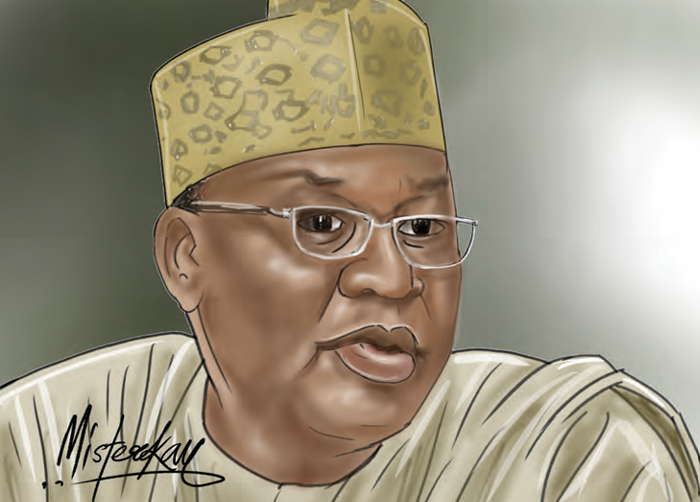IBB @83: Philosophising Leadership Imperatives …C0NTINUE READING HERE >>>
Today is the 83rd birthday of former Military President Ibrahim Badamasi Babangida, the armoured General who strode and ruled the nation’s corridors of power for eight years after overthrowing his predecessor, General Muhammadu Buhari, through a bloodless coup in August 1985. Of all the military officers that have emerged as leaders, the man popularly known and called by his initials, IBB, was adequately prepared to lead his country.
Popular But Realistic
Not a few heaved a sigh of relief as the Buhari-led junta was announced toppled by General Joshua Dogonyaro. IBB would later be ascribed with the sobriquets of “Maradona” by largely his admirers or “Evil Genius” by his critics. He was never short of a stream of admirers and acerbic opponents who were more of detractors, armed with weapons of intellectual coercion. After assuming power and taking into cognisance the dangers of human rights violations, the gates of prisons were thrown open. Politicians who were languishing in jail breathed the air of freedom.
He turned into a democrat when he enjoined the public to debate on the relevance or otherwise of the proposed International Monetary Fund (IMF) loan. The debate became a training session for left-and- right-wing academics as they engaged in intellectual duels. To provide a roadmap in revolutionising the nation’s politics, the military president in 1986, set up a 17-member Political Bureau, headed by Dr Samuel Joseph Cookey, to review “Nigeria’s political history and identify the basic problems which have led to our failure in the past and suggest ways of resolving and coping with these problems.”
Soft But Determined
The report of the Cookey-led Political Bureau encapsulated the regime’s roadmap in evolving new templates for a political system devoid of the influence of fat cats whose influence in manipulating the political process has been troubling. His administration replaced the multi-party party system with a two-party system in order to discourage the deployment of ethnic sentiments as witnessed in the First and Second Republics.
The military regime under him was involved in developing infrastructure that had never been seen before. In response to cries against dominance, he created in all nine states to free the minorities from the grip of an oppressive majority group. Even as head of state, he felt the pains of the minorities but could do little as he found out later that emancipating the minorities remains a herculean exercise. The outcomes of the administration’s economic policies still resonate with current realities. His capacity to read the times and act appropriately remains one of his greatest traits.
As a leader, there were issues that dogged his administration and still remain reference points. The OIC controversy; the killing of Dele Giwa through a parcel bomb; the Gulf War $12bn Windfall and, finally, the annulment of June 12 presidential poll. All these grey areas have been examined, and the man whom many love to hate has spoken extensively on these matters. Succeeding governments, especially during the second coming of General Olusegun Obasanjo, whom he helped to install in May 1999, threw searchlights on him to ascertain corruption allegations against him, but nothing was found against him. IBB remains a recurring national discourse topic, and what he did or did not do during his time in power is still topical. The annulment of the June 12 poll may continue to influence the assessment of his footprints by those who felt injured by the cancellation. IBB has owned up to the act, but the June 12 advocates have made a tomb of remembrance for political advantage.
Leadership In Service
It was not a walk in the park for a young child from Niger State who was orphaned early in life to walk to the nation’s highest office. Being a trustworthy leader among his troops, his soldiers fought hard and were miles ahead of coupists plotting his downfall. Attaining the enviable age of 83 remains a milestone for not only him but what he did, rightly and wrongly, for his country. That he still breathes today is a testimony to his good-heartedness and divine blessings.
It has been over a year since I visited the soft-spoken former military president, who is also one of Nigeria’s greatest leaders of all time. His Minna Hilltop mansion remains a Mecca for those seeking blessings in all human endeavours. Despite “stepping aside” from power for 31 years, short of 10 days today, IBB holds sessions with both the low and the mighty. When he left Abuja Aso Villa, he never left his teeming admirers who still admire the “Prince of the Niger”. The recent visit to his home by officials of the Christian Association of Nigeria (CAN) reveals his good state of health.
I have had the rare privilege of meeting IBB and discovered there’s a remarkable difference between the IBB as portrayed in the public and the Real IBB. The saint or devil is only revealed at close contact, not from the public lens. Someday and soonest, I hope to unveil this overwhelming paradox of national consequences whose role in our national history remains a rancorous storm for many. As he celebrates his 83rd birthday today, May the present and future be kind to him always. General IBB has taken all criticism and applause in his strides. Happy 83 birthday to the Military President who is not bellicose to both superiors and juniors!
>
